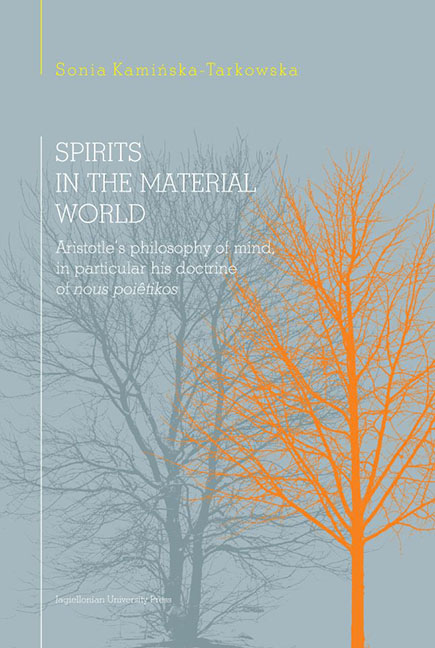 Spirits in the Material World
Spirits in the Material World Aristotle and Brentano
Published online by Cambridge University Press: 14 October 2023
Summary
Are Brentano’s Habilitationsthesen Aristotelian and What Do They Say about Nous Poiêtikos?
This chapter is meant to be a commentary on Franz Brentano’s 25 Habilitationsthesen that – together with The Psychology of Aristotle – compose Brentano’s ‘habilitation project’. Liliana Albertazzi claims that Brentano obtained his habilitation on 15 July 1866, in Würzburg, after he defended the theses in question. 15 July was the day of his Probevortrag and a session of the university senate. An open defence of the theses in Latin took place on 14 July. Rolf George and Glen Koehn, in ‘Brentano’s Relation to Aristotle’, state that Brentano had submitted his Habilitationsschrift: Die Psychologie des Aristoteles, insbesondere seine Lehre vom nous poietikos (for some reason the English translation omits the second – and crucial – part of the title, which I – in turn – explore in the title of my book) as early as 1865. Wolfgang Huemer, on the other hand, dates this book to 1867 (and so does George in the foreword to the English translation of the work). This discrepancy may follow from the fact that George and Koehn give the date of submission and Huemer (and George) – of publication. Interestingly the book most probably was ready before the theses were defended and thus naming it their follow-up (which is very common) can be called into question. Brentano’s ‘Preface’ is dated 14 July 1866 – the exact day of his defence. So, it is reasonable to claim that he had worked on the theses and the book simultaneously. Both Albertazzi and George/Koehn stress that habilitation was a sine qua non condition of conducting classes at the university and I find this crucial, since teaching was Brentano’s great mission.
As to Brentano’s habilitation, Wilhelm Baumgartner says: ‘First, [Franz] Hoffmann, a scholar of Schelling’s and Baader’s philosophy, had supervised Brentano’s habilitation and had suggested that Brentano should deliver his habilitation lecture on Schelling’s philosophy. Brentano did so, but with a rather critical attitude towards Schelling’. Elsewhere Baumgartner says:
When the young Brentano began his philosophical career in Würzburg, he pronounced in his famous fourth habilitation thesis that ‘the true philosophical method is the same as the method of natural science’.
- Type
- Chapter
- Information
- Spirits in the Material WorldAristotle's Philosophy of Mind in Particular His Doctrine of Nous Poiêtikos, pp. 97 - 140Publisher: Jagiellonian University PressPrint publication year: 2022
